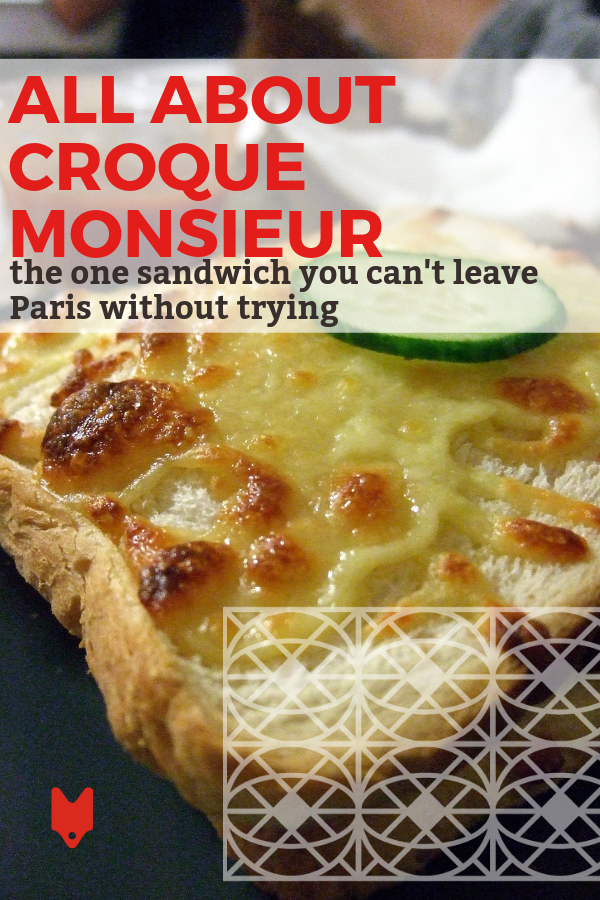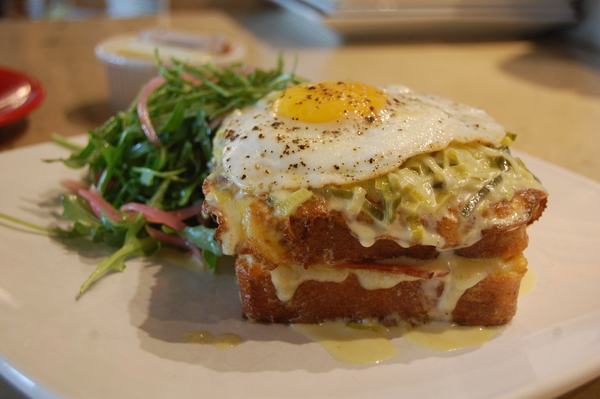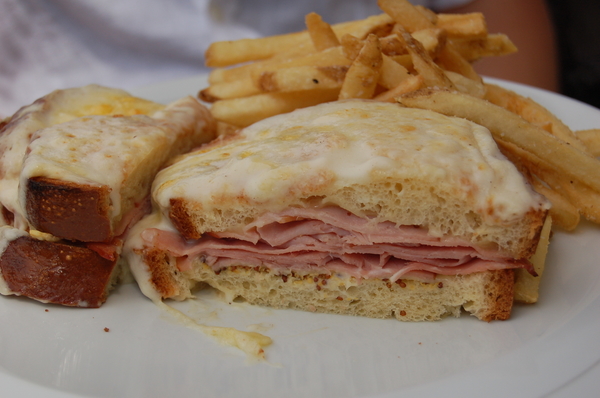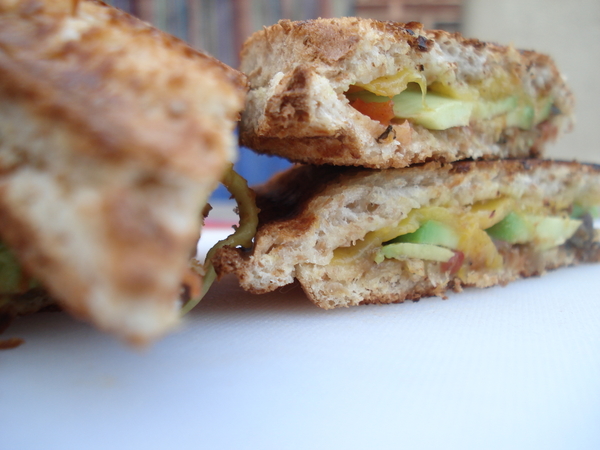Think of France’s croque monsieur as the lovechild of a grilled cheese and a ham and cheese sandwich.
Ham and gruyere are sandwiched between two slices of white bread, topped with béchamel sauce, and broiled. Served with a green salad, it’s a common, quick-and-easy Sunday supper for many French families.

Photo Credit: Kayhadrin, Text Overlay: Devour Paris Food Tours
The Origin Story
But this comfort food staple is also an emblem of the Parisian café. Most croque monsieur origin stories point to Le Bel Age café and proprietor Michel Lunarca as the instigator of the croque. It’s said that around 1910, the so-called “crunchy mister” got its name when Lunarca told patrons his broiled sandwiches featured “mister meat.”
Luckily, Lunarca wasn’t actually a cannibal, and his ham-and-cheese concoctions took off. Soon, croques could be found everywhere, occasionally topped with a fried egg, which transformed the sandwich from a monsieur, into a madame.

The Fall of a Giant
Over time, the sandwiches fell out of vogue, appearing nearly exclusively on the menus of cafés catering to tourists. These unfortunate croques, often reheated from frozen, feature congealed cheese, soggy bread and mealy béchamel.
Luckily, that’s all changing, as modern restaurateurs endeavor to bring this Parisian classic back to life.
It’s not easy. A sandwich relying only on three main ingredients needs each and every one of them to be of the best quality: artisanal country bread, raw milk cheese, and only the best ham. For the latter, many top restaurateurs rely on Prince de Paris, the last producer of true “Paris ham” in the capital.
Owner Yves Le Guel bought the company in 2005, intent on producing artisanal ham using local methods dating back to the 1700s. Brined in an aromatic broth and slow-cooked over low heat, these hams are tender, juicy and completely devoid of artificial additives or preservatives.

The Croque Today
It’s no surprise these hams feature on the tables (and croques!) of top establishments like Frenchie to Go, the quick-service sister of Michelin-starred Frenchie restaurant. Here, the staff serves up a seasonal croque every Christmas, with Prince de Paris ham, truffle and rich, creamy Brillat Savarin standing in for traditional gruyere.
Frenchie isn’t the only spot taking liberties with the traditional gruyere cheese. Laurent Dubois is one such tinkerer—appropriate for this MOF cheesemonger, one of the best in the capital. At his restaurant at the top of the gorgeous 19th-century Printemps department store, he features a variety of alternative croques, like aged goat cheese with sautéed spinach and pine nuts, or smoked salmon and ricotta.
When it came to designing a restaurant devoted to cheese, the team “decided to put the spotlight on the croque, rather than pizza, which is already quite well known, or a burger, which has already been revisited hundreds of times,” explains Carl Legrain, manager of the restaurant. “We thought to ourselves: the croque monsieur could be interesting.”

Dubois isn’t alone: a handful of croque-centric restaurants have popped up across the French capital, like trendy Madame Messieurs, whose menu boasts creations like the François, with Serrano ham, roasted peppers and sheepsmilk Ossau Iraty cheese, or the Charles with apples, mango, fig, smoked duck breast and foie gras.
The Croque, too, features a fully croque menu, including, of course, Le Clasico, featuring Prince de Paris ham. But other croques, like salmon, cream cheese and dill or goat cheese with walnuts, tomato and mushroom are also on offer. There are even a few sweet versions, like nutella with banana and mascarpone or honey and goat cheese.
For founder Frédérique Blanc, this creative approach to fillings is just one way of updating the croque monsieur to make it more palatable for modern diners. Her street food approach calls for both béchamel and egg (in the case of the madame) to be placed inside the sandwich, to make it easier to eat on the go (and negate the old-fashioned need for a fork.)
With such huge variety, however, at what point is a croque no longer a croque? While Blanc notes that, at its core, a croque monsieur is truly a combination of ham, cheese, bread and béchamel, she also explains that, for her, a croque could really be any hot sandwich—provided it’s made on true French bread. Hers comes from artisan baker Jean-Luc Poujauran: the perfect base for the high-quality ingredients diners find inside.
“I wanted to do something simple but something French,” she explains of her concept. “I wanted to highlight magnificent French ingredients and update the croque monsieur to a modern, enjoyable, nourishing, balanced street food.”
Whether you’re modernizing this French sandwich or sticking with tradition (as in this version from the New York Times), the croque monsieur is simplicity defined—and a Parisian classic that thankfully isn’t going anywhere any time soon.